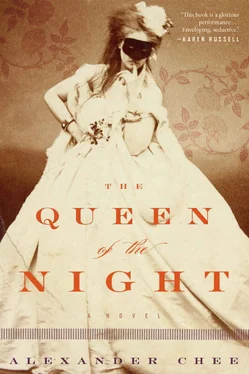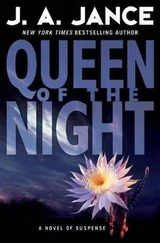Euphrosyne was a vision. In the light from the door, she glowed as she shrugged a new white fur opera cloak closer to her. An ostrich plume fluttered atop her white velvet hat and nicked the top of the doorway. She laughed and petted it down, and then came down the stairs with the flutter of at least a hundred tiny black ribbon bows on her black silk toile gown’s skirt. Diamonds flashed in her ears and at her throat. A gentleman beside her, with her on his arm, was busy speaking with another coming along behind them. She let go his arm and waited for help from the driver to enter the carriage, and as she did, I stepped forward.
The driver looked at me as he might at a beggar or an assassin and glared, waving me back. She had ignored me, and I was so embarrassed to be snubbed by her, I stayed quiet, but as I stepped back, the general’s coat caught her eye, and then my face came into view.
You little bitch, she whispered, a smile growing on her face as her gentlemen paused at the carriage door and the driver stared. I knew they couldn’t kill you. And then she leapt at me with a cry and pulled me to her.
I prayed to God to bring you back to me, she said, and then looked up at the sky and said, Thank you! And then she kissed me again and again, saying it was the only way to know I wasn’t a ghost. She pulled my arm to her in our old way and began to walk me down the street. When her companions in the carriage protested at her abrupt departure, offering at least a ride, she turned and waved them on before continuing with me.
My dears, she shouted. She is just back from the dead. Please forgive me and return for me at intermission.
I came back to tell you everything, I said, as she waved to hire us another driver.
Of course, she said. Tell me everything.
§
She took me to a little bistro, where we smoked and had little glasses of wine. We made a strange pair, I knew, talking closely, she in her opera finery, I in my junk-peddler toilette, and soon many of the other tables were watching us. She turned at one point and said to the too-curious audience around us, This is not a show, unless it is a show, in which case give us a coin and she will sing.
Ashamed, they turned back to their conversations.
You can’t return to the Majeurs, she said. If Odile knows you are alive, she’ll be furious. At the least she’ll have you arrested, for it shames her, too. He is still a regular client.
Yes, of course, I said, though this surprised me. Of course, during my absence, the tenor had again become a good customer.
You must go back to this comtesse, she said. Beg for her forgiveness, tell her what you know, and, most important, ask for her advice and protection. You’re in terrible danger. And then she paused, and a little glint came into her eye. This woman, she is one of the great courtesans, after all.
I nodded, uncertain. This I did not know.
Perhaps she will teach you something. She and Giulia Barucci even share a lover, a rich banker. I heard he settled a half-million francs on her.
I let out a startled laugh.
Where did you get these clothes? she asked. Is this what they buried you in?
I shook my head, still laughing. No, no. A junk peddler.
Ah, she said, fingering the dress. This is what they buried someone else in. They’re all grave robbers. Be careful wearing a dead woman’s clothes. Don’t wear them too long. I will see if I can find something I don’t wear anymore until we can get you set up.
She turned to check a beautiful watch made to look like a gold brooch. I must go, she said. But when you want to see me next, leave a message with this barman here; I come in every time I can.
The man behind the bar nodded to me.
This man, I think he wants to marry me, she said. Can you imagine?
Yes, I said, and smiled at the barman. I could. For she had become more beautiful than ever, not just because of her finery.
No, not the barman, she said. The other one, with the carriage. Maybe this one will marry you. She winked and then kissed me twice. Don’t you dare die again, she said into my ear before she let go. And with that, she returned to wait for the carriage he’d send for her at intermission, and I stayed for another drink with the barman before returning to my room.
§
On the fourth day in the Bois, in the late morning, the grand black carriage I knew so well pulled to a stop, and when I saw the Comtesse’s familiar crest on the side, I leapt up and ran to it.
Little girl, came the voice of her driver. Is it you, La Muette? Where have you been?
I kept running to him and smiled as he jumped down and opened the door.
This time I was shown in through the service entrance. Her maid greeted me, a new one I’d not met before, and brought me into the parlor, where the Comtesse sat waiting.
I saw her an instant before she noticed I’d entered. She was seated, her hair bound up and then falling down her back in curls. She wore a simple black muslin tea gown, almost demure except for the way it accentuated her coiffure and bust. Her portraits were now hung all around her on the walls, turning the room into a theater of her expressions, with her at the center. The one I noticed most was a painted photograph I had never seen of her dressed in the nun’s habit I’d first repaired: the Comtesse transformed into a nun, but her face a mask of implacable enmity. Her eyes were hooded and yet also flaring, the whites visible beneath her pupils as she looked up in a mockery of a prayer. This was a face that promised not so much murder as an eternal war waged for a revenge that would have no end.
In the soft light of the room, her face was a pale reflection of this as she gazed into the distance as I entered. I froze in place, not daring to move forward. I had made a terrible mistake in coming here.
She then saw me, and her eyes lit with affection, and she was all concern.
Sit down, sit down. Where have you been? I was stunned to get your note. I thought you were dead. I could not believe it was from you.
A little speech in my head, a lie about how my voice had returned, vanished as I tried to begin it.
You should have come straight to me at once, she said. I was told you had either escaped or were kidnapped or were perhaps murdered. She held a letter out from beside her and shook it once. The paper made a crisp snap.
A search party even went through the woods looking for signs of you, she said, and set the letter down. The Empress was quite fond of her mute grisette and was distraught to lose her. The palace chamberlain had the good grace to write to apologize to me. And yet you are not lost. Instead, you managed something few have managed, to escape from Compiègne.
Here we were both silent.
What a little mystery you are. Perhaps I am wasting your talents, and she laughed as she said this, as if she’d surprised herself. Perhaps you should do more for me. And yet you have disappointed me.
At this, a terrible coldness swept over me down into my bones.
But why the escape? I hope you are here to explain. She called for paper and pen, and asked me to write for her all that had occurred.
There’s no need for that, I said, as the maid entered the room. I didn’t know how to explain my voice, and any further pretense was unbearable. I wanted to be done with La Muette.
She stared, and now she was the one who momentarily seemed frightened.
I took a little pride in that, but only a little.
When I looked up again and met the Comtesse’s eyes, it was as if we were meeting for the first time.
Now we moved into opposite roles. I spoke and she listened.
I passed to her the list of the Empress’s gowns, such as I had been able to keep, and as she read it, I tried to think of what I would tell her.
Читать дальше












